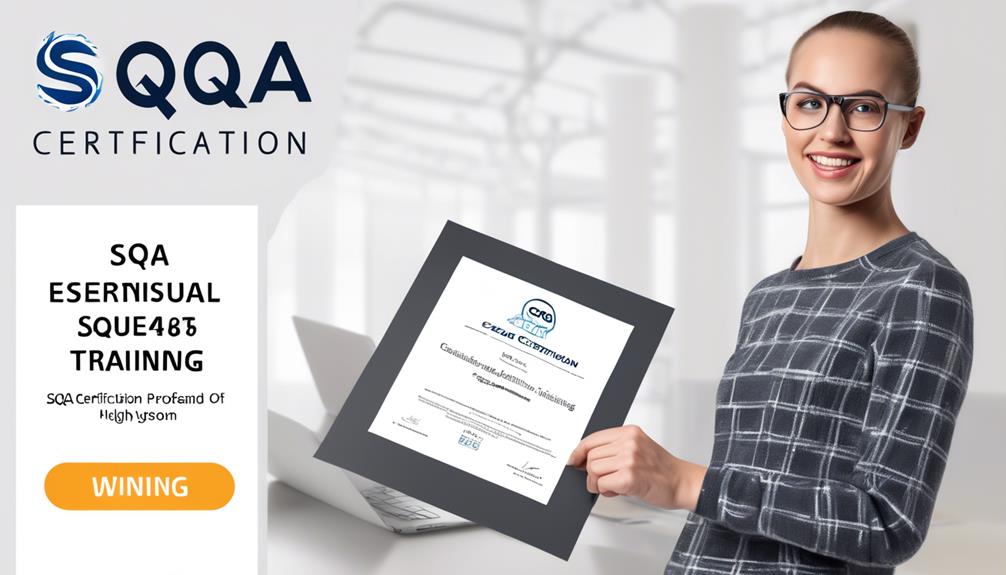In today’s competitive software development industry, it is crucial for companies to prioritize the development of high-quality software in order to remain competitive. Businesses depend on Software Quality Assurance (SQA) techniques and tools that adhere to global standards to achieve and maintain the desired levels of software quality.
SQA involves a proactive and systematic approach to prevent defects and ensure that software meets the desired quality standards. By implementing SQA frameworks and methodologies, organizations can improve the development process, enhance customer satisfaction, and minimize risks.
ISO standards play a vital role in SQA, providing organizations with the necessary guidelines and benchmarks to evaluate and enhance their software quality. ISO standards in SQA cover various aspects, including documentation, testing, process improvement, and compliance with industry best practices.
Key Takeaways:
- Software Quality Assurance (SQA) is a proactive approach to prevent defects and improve software quality.
- International standards in SQA, such as ISO standards, provide guidelines and benchmarks for evaluating and enhancing software quality.
- Implementing SQA frameworks and methodologies helps organizations deliver high-quality software and minimize risks.
- SQA involves documentation, testing, process improvement, and compliance with industry best practices.
- Adhering to international standards elevates software quality and enhances customer satisfaction.
What is Software Quality Assurance (SQA)?
Software Quality Assurance (SQA) is our proactive and systematic approach to preventing defects and ensuring that software meets the desired quality standards. We employ a set of tasks and processes performed throughout the software development lifecycle to identify and address potential quality issues. Our primary goal is to improve the development process and deliver high-quality software that meets user requirements and expectations.
SQA involves the implementation of various frameworks and methodologies to achieve these objectives. By adhering to software quality management principles, we prioritize quality at every stage of development, resulting in superior software products.
Our SQA practices encompass a comprehensive range of activities, including requirements analysis, design review, code inspection, unit testing, system testing, integration testing, and performance testing. By integrating these tasks into our development processes, we ensure that the software we deliver is reliable, robust, and meets our clients’ expectations.
“Software Quality Assurance is not just about finding bugs; it is about preventing them from ever happening.
Software Quality Assurance Frameworks and Methodologies
We follow industry-standard frameworks and methodologies to ensure effective SQA implementation. These frameworks provide a structured approach to software development and quality management, enabling us to consistently deliver high-quality software.
- Waterfall Model: A sequential development model that emphasizes documentation and rigorous planning.
- Agile Methodology: An iterative and collaborative approach that promotes flexibility, rapid development, and early delivery of working software.
- DevOps: A combination of development and operations, emphasizing collaboration, automation, and continuous integration and deployment.
- Six Sigma: A data-driven approach that focuses on reducing defects and improving process efficiency.
- Lean Development: A methodology that aims to eliminate waste, improve productivity, and deliver value to customers.
By leveraging these industry-standard frameworks, we ensure that our SQA practices align with global software quality assurance standards. This allows us to deliver software that not only meets our clients’ specific requirements but also adheres to international quality assurance guidelines.
| Software Quality Assurance | SQA Frameworks and Methodologies |
|---|---|
| Software quality assurance is a proactive and systematic approach to preventing defects. | The framework and methodologies we employ include the Waterfall Model, Agile Methodology, DevOps, Six Sigma, and Lean Development. |
| It involves a set of tasks and processes performed throughout the software development lifecycle. | By leveraging these frameworks, we ensure that our SQA practices align with global software quality assurance standards. |
| Our primary goal is to improve the development process and deliver high-quality software. | These frameworks enable us to consistently deliver high-quality software that meets user requirements and expectations. |
What is a Software Audit?
Software audits play a vital role in ensuring quality control in software development, compliance with SQA standards, and obtaining SQA certifications. These audits involve a thorough retrospective assessment of software projects, processes, or products. Led by an independent software audit team, these examinations carefully scrutinize software artifacts, documentation, and development practices to identify areas of improvement, assess compliance with industry standards and regulations, and ensure adherence to best practices. The ultimate goal of software audits is to ensure compliance, identify weaknesses and risks, and provide valuable recommendations for improvement.
Software audits are an essential component of comprehensive quality control in software development. By conducting rigorous assessments, organizations can create a culture of continuous improvement and maintain a high level of quality in their software products. Additionally, compliance with SQA standards and obtaining relevant certifications not only demonstrates a commitment to industry best practices but also enhances the organization’s reputation and instills confidence in stakeholders.
Having a robust software audit process allows organizations to identify and rectify any deficiencies in their software development practices. By ensuring compliance with SQA standards and certifications, organizations can mitigate risks, enhance their software quality, and optimize their development processes. The insights gained from software audits enable organizations to make data-driven decisions to improve their software quality assurance initiatives.
Software audits are an integral part of effective quality control in software development. By conducting comprehensive assessments, we can identify areas for improvement, ensure compliance with SQA standards, and obtain valuable certifications. These audits help us enhance our software quality and maintain a high level of integrity in our development processes.”
Key Components and Scope of a Software Quality Audit
In order to ensure software quality and compliance with industry standards, a comprehensive software quality audit evaluates various components of the software development process. These audits are essential to identify areas for improvement and assess adherence to software quality assurance (SQA) standards.
During a software quality audit, several key components are assessed:
- Documentation Review: The audit examines the documentation associated with the software development process. This includes requirements documentation, design specifications, test plans, and user manuals. A thorough examination of the documentation ensures that it is accurate, complete, and in compliance with SQA industry standards.
- Code Review: The audit evaluates the quality and integrity of the software code. It assesses the coding standards, readability, modularity, and adherence to best practices. Code reviews help identify potential coding errors, vulnerabilities, and areas for optimization.
- Testing Evaluation: The audit assesses the testing strategy and execution to verify that comprehensive testing has been conducted. It evaluates the test plans, test cases, and test coverage to ensure that all functional and non-functional requirements have been adequately tested.
- Process Review: The audit examines the software development processes and methodologies in place. It assesses the efficiency and effectiveness of the processes, identifies bottlenecks, and recommends process improvements. This component ensures that the development processes align with global SQA standards and best practices.
- Security Assessment: Security is a critical aspect of software quality. The audit evaluates the security measures and protocols implemented in the software development process. It identifies potential security vulnerabilities, assesses the effectiveness of the security controls, and recommends enhancements to safeguard against threats.
- Performance Analysis: The audit examines the performance characteristics of the software, including response times, scalability, and resource utilization. It assesses the software’s performance against defined benchmarks or industry standards. Performance analysis helps identify performance bottlenecks and areas for optimization.
- Compliance Assessment: Compliance with industry standards and regulations is essential for software products. The audit assesses the software’s compliance with global SQA standards, such as ISO standards, and industry-specific regulations. Compliance assessment ensures that the software meets the required quality standards and regulatory requirements.
By evaluating these key components, a software quality audit provides organizations with a comprehensive assessment of software quality and adherence to SQA industry standards. This enables them to identify areas for improvement, enhance software quality processes, and ensure compliance with global SQA standards.
Benefits of Software Quality Audits
Software quality audits offer a multitude of benefits that help organizations enhance their software development processes and deliver high-quality solutions. These audits ensure adherence to international quality assurance guidelines, provide assurance of compliance with standards, and mitigate risks throughout the development lifecycle.
One of the primary advantages of software quality audits is the identification and remediation of deficiencies. By thoroughly examining software products, processes, and methodologies, audits reveal areas for improvement and enable organizations to address them effectively. This leads to the optimization and efficiency of development processes, enhancing overall software quality.
Moreover, software quality audits instill confidence in stakeholders, including clients, investors, and end-users. By conducting audits that follow best practices for software quality, organizations demonstrate their commitment to delivering reliable and secure software solutions. This, in turn, fosters trust and credibility, enhancing long-term business relationships.
“Software quality audits ensure compliance with global software quality assurance frameworks and international quality assurance guidelines.”
In addition to compliance with standards, software quality audits play a crucial role in risk mitigation. By thoroughly evaluating the development process, audits identify potential risks and vulnerabilities, allowing organizations to proactively address them. This proactive approach minimizes the likelihood of quality issues and reduces the potential impact of risks on project timelines, budgets, and overall software quality.
Furthermore, software quality audits facilitate process optimization and efficiency. By analyzing the entire software development lifecycle, audits identify bottlenecks, inefficiencies, and areas where process improvements are needed. This optimization ensures streamlined workflows, reduces waste, and enhances the overall efficiency of software development operations.
The Benefits of Software Quality Audits at a Glance:
- Identification and remediation of deficiencies
- Assurance of compliance with global software quality standards
- Mitigation of risks throughout the development lifecycle
- Process optimization and efficiency

In summary, software quality audits offer comprehensive assurance of compliance with international standards, while also enhancing development practices and mitigating risks. By optimizing processes and improving efficiency, organizations can deliver high-quality software solutions that meet the expectations of stakeholders and end-users alike.
How to Implement Software Quality Assurance
Implementing software quality assurance involves several key steps to ensure the successful integration of quality standards and practices into the software development process.
Quality Planning
In the first step, quality planning, we define the desired quality standards for the software project. This includes outlining the specific quality requirements, objectives, and metrics that will be used to assess the software’s performance and effectiveness.
Stakeholder Involvement
We believe that involving stakeholders throughout the software development process is crucial for effective quality assurance. By engaging stakeholders, such as customers, end-users, and quality assurance experts, we can gather valuable insights and perspectives that help shape the quality goals and ensure their alignment with user expectations.
Risk-Based Approach
A risk-based approach is vital in identifying potential risks and prioritizing quality assurance efforts. By conducting risk assessments and analyzing potential threats to the software’s performance and security, we can allocate resources and focus on the areas that pose the greatest risk to quality.
Continuous Improvement
Continuous improvement is at the core of software quality assurance. We believe in an iterative approach that involves regular reviews, evaluations, and feedback to identify areas for improvement and implement corrective actions. By continuously refining our processes and practices, we can enhance software quality and drive efficiency in the development lifecycle.
“Continuous improvement is not about the things we do well – that’s work. Continuous improvement is about the things we do badly – that’s evaluation.” – Dr. Goddard
Through effective quality planning, stakeholder involvement, a risk-based approach, and a commitment to continuous improvement, organizations can optimize their software quality assurance efforts and deliver high-quality software that meets user expectations.
Take a look at the table below for a visual representation of the steps involved in implementing software quality assurance:
| Steps | Details |
|---|---|
| 1. Quality Planning | Define quality standards, requirements, and metrics. |
| 2. Stakeholder Involvement | Engage stakeholders to gather insights and align quality goals. |
| 3. Risk-Based Approach | Identify and prioritize potential risks to focus quality efforts. |
| 4. Continuous Improvement | Regularly review, evaluate, and refine processes for better quality. |
The Principles of Software Quality Assurance
Software quality assurance is driven by a set of principles aimed at ensuring the efficient implementation of SQA and the achievement of high-quality standards. These principles encompass defect prevention, continuous improvement, stakeholder involvement, and a risk-based approach.
Defect Prevention: We prioritize identifying and addressing potential defects early in the software development lifecycle. By implementing robust quality control measures and promoting a culture of vigilance, we aim to minimize the occurrence of defects and their impact on the final product.
Continuous Improvement: Our commitment to continuous improvement drives us to regularly assess and refine our SQA processes. We actively seek feedback, monitor performance metrics, and implement corrective actions to enhance our overall quality standards continually.
Stakeholder Involvement: We recognize the invaluable contributions of all stakeholders in the software development process. Engaging stakeholders throughout the SQA journey enables us to gather diverse perspectives, align goals, and build consensus on quality requirements, resulting in a product that satisfies all stakeholders’ expectations.
Risk-Based Approach: Our SQA practices are rooted in a risk-based approach that enables us to allocate resources effectively and prioritize testing efforts. By identifying and assessing potential risks, we can focus our attention on critical areas, mitigating risks, and enhancing the overall quality of our software.
By adhering to these principles, we empower our teams to implement software quality assurance effectively, delivering high-quality products that meet and exceed the expectations of our stakeholders.
| Principles of Software Quality Assurance |
|---|
| Defect Prevention |
| Continuous Improvement |
| Stakeholder Involvement |
| Risk-Based Approach |
Different Software Quality Assurance Approaches
When it comes to software quality assurance, there are various approaches organizations can take based on their project requirements. Each approach has its own characteristics and methodologies that contribute to achieving high-quality software. Let’s take a closer look at some of the most prominent approaches:
Traditional Approach
The traditional approach to software quality assurance follows a sequential and structured process. It involves detailed planning, requirements gathering, design, development, testing, and deployment. This approach is best suited for projects with fixed requirements and a stable development environment.
Agile Approach
The agile approach emphasizes flexibility, collaboration, and iterative development. It promotes continuous feedback and adaptation, enabling teams to deliver working software in short iterations. Agile methodologies, such as Scrum and Kanban, prioritize customer satisfaction and respond quickly to changing requirements.
DevOps Approach
The DevOps approach focuses on bridging the gap between development and operations teams. It emphasizes automation, collaboration, and continuous integration and continuous deployment (CI/CD). DevOps ensures rapid software delivery, improved quality, and faster time to market through close collaboration and shared responsibilities between teams.
Six Sigma Approach
The Six Sigma approach aims to minimize defects and variations in software development processes. It utilizes statistical analysis and problem-solving techniques to reduce process variations and improve quality. Six Sigma methodologies, such as DMAIC (Define, Measure, Analyze, Improve, Control), help organizations achieve operational excellence and deliver high-quality software consistently.
Lean Approach
The lean approach focuses on reducing waste, improving efficiency, and delivering value to customers. It emphasizes the elimination of non-value-added activities and continuous improvement. Lean methodologies, such as Lean Six Sigma and Lean Software Development, aim to optimize processes and maximize customer satisfaction.
Continuous Integration and Continuous Deployment (CI/CD) Approach
The CI/CD approach revolves around frequently integrating code changes into a shared repository and continuously deploying the software in a production environment. It ensures that developers’ code changes are automatically tested and deployed, reducing the risk of integration issues and enabling rapid delivery.
Test-Driven Development (TDD) Approach
The TDD approach emphasizes writing tests before writing the actual code. It follows a red-green-refactor cycle, where developers write failing tests, implement the code to make the tests pass, and then refactor the code to improve its design and maintainability. TDD ensures code functionality and provides a safety net for making changes without introducing defects.
Each software quality assurance approach offers its own set of benefits and advantages depending on the project requirements. By understanding the characteristics and methodologies of these approaches, organizations can choose the most suitable approach to ensure the delivery of high-quality software.

Automated Test Case Generation
Automated test case generation, using machine learning algorithms, revolutionizes the way we approach software testing. By harnessing the power of AI, we are able to efficiently create comprehensive test cases that provide broader coverage. This enables us to uncover potential issues and vulnerabilities, ensuring a higher level of software quality.
With automated test case generation, we can expedite the testing process and reduce the likelihood of undetected bugs slipping into production. By leveraging machine learning algorithms, we are able to analyze and understand the complexities of the software, identifying critical areas that require thorough testing.
By automating the test case generation process, we eliminate the need for manual test case creation, saving time and resources. Our AI-powered system intelligently generates test scenarios that cover diverse paths and edge cases, ensuring comprehensive testing coverage.
The result is a robust and reliable testing framework that provides a solid foundation to validate the software’s functionality, performance, and security.
Automated test case generation is a game-changer in the software development lifecycle, empowering us to deliver high-quality software with confidence. With its ability to create comprehensive test cases and provide broader test coverage, this innovative approach has become a vital component in our pursuit of excellence in software quality assurance.
Dynamic Test Scenario Adaptation
At GenAI, we understand the adaptive nature of dynamic test scenario adaptation in software testing. As code evolves and changes over time, it’s crucial to ensure that our test cases remain relevant and effective. Our advanced technology automatically adjusts the test scenarios based on these evolving code changes, allowing for comprehensive and efficient test coverage.
With dynamic test scenario adaptation, we address the challenges posed by rapid development cycles. By adapting our test cases to align with the evolving code changes, we can effectively test the functionality and stability of the software. This adaptive approach saves time and resources while maximizing the effectiveness of our testing efforts.
By embracing dynamic test scenario adaptation, we can confidently navigate the ever-changing landscape of software development. Our commitment to staying at the forefront of technological advancements ensures that our testing processes remain efficient and effective, even as software requirements and development methodologies continue to evolve.
Through continuous learning and optimization, our adaptive approach to test scenario adaptation enables us to provide comprehensive and accurate testing results, ensuring the highest quality software for our clients.
Predictive Defect Analysis
At GenAI, we leverage the power of predictive defect analysis to enhance your software testing efforts. By utilizing historical data and machine learning models, we can identify potential areas of concern within your codebase before they become critical issues.
This advanced technique allows our QA teams to prioritize testing efforts effectively, allocating resources where they are needed the most. By focusing on these high-risk areas, we can ensure more targeted and efficient testing, saving time and effort while maintaining the highest level of quality assurance.
Implementing predictive defect analysis not only improves the accuracy and effectiveness of testing but also enables us to preemptively address potential defects, minimizing the impact on your software development process. With this proactive approach, you can have confidence in the reliability and performance of your software, ultimately contributing to a better user experience.
Conclusion
GenAI is revolutionizing software quality assurance with its cutting-edge artificial intelligence capabilities. Through the use of advanced algorithms and machine learning models, GenAI automates and optimizes crucial testing processes, resulting in elevated software quality.
One of the standout features of GenAI is its automated test case generation. By leveraging AI, comprehensive test cases are created, ensuring broader test coverage and minimizing the likelihood of undetected bugs slipping through.
In addition, GenAI’s dynamic test scenario adaptation allows for seamless adjustments to test cases, accommodating evolving code changes. This adaptive nature guarantees that test coverage remains comprehensive and efficient, even in fast-paced development cycles.
Furthermore, with predictive defect analysis powered by machine learning models, GenAI enables quality assurance teams to prioritize their testing efforts effectively. By identifying potential areas of concern within the codebase, QA teams can allocate resources strategically, resulting in a more targeted and efficient testing strategy.
FAQ
What is software quality assurance (SQA)?
Software Quality Assurance (SQA) is a proactive and systematic approach to preventing defects and ensuring that software meets the desired quality standards. It involves tasks and processes performed throughout the software development lifecycle to identify and address potential quality issues, improve the development process, and deliver high-quality software that meets user requirements and expectations.
What is a software audit?
A software audit is an independent and systematic examination of software artifacts, documentation, and development practices to identify areas of improvement, assess compliance with standards and regulations, and ensure adherence to best practices. It helps organizations improve software quality, mitigate risks, and optimize development processes and efficiency.
What does a software quality audit evaluate?
A software quality audit evaluates various aspects of software development, including documentation review, code review, testing evaluation, process review, security assessment, performance analysis, and compliance assessment. These components ensure a comprehensive evaluation of software quality and adherence to industry standards and best practices.
What benefits do software quality audits provide?
Software quality audits have significant benefits, including the identification and remediation of deficiencies, assurance of compliance with standards, mitigation of risks, and process optimization and efficiency. Audits help organizations improve software quality, instill confidence in stakeholders, and enhance overall development standards.
How can software quality assurance be implemented?
Implementing software quality assurance involves defining quality standards, planning SQA activities, conducting reviews, performing testing, monitoring and measuring, and continuously improving the SQA process. It requires clear objectives, collaboration among stakeholders, and a focus on risk management and improvement.
What are the principles of software quality assurance?
The principles of software quality assurance include defect prevention, continuous improvement, stakeholder involvement, and a risk-based approach. These principles ensure the efficient implementation of SQA and the achievement of high-quality standards.
What are the different software quality assurance approaches?
There are different approaches to software quality assurance, including traditional, agile, DevOps, six sigma, lean, continuous integration and continuous deployment (CI/CD), and test-driven development (TDD) approaches. Each approach has its own characteristics and is suitable for different project requirements.
How does automated test case generation improve software quality?
Automated test case generation, using machine learning algorithms, enables the creation of comprehensive test cases with broader coverage. It expedites the testing process and reduces the likelihood of undetected bugs slipping into production.
How does dynamic test scenario adaptation enhance software quality?
GenAI’s adaptive nature allows for dynamic test scenario adaptation, automatically adjusting test cases based on evolving code changes. This ensures test coverage remains comprehensive and efficient, even with rapid development cycles.
What is predictive defect analysis?
GenAI utilizes historical data and machine learning models to predict potential areas of concern within the codebase. This enables QA teams to prioritize testing efforts and allocate resources effectively, contributing to a more targeted and effective testing strategy.
What are the main benefits of using GenAI in software quality assurance?
GenAI represents a game-changer in software quality assurance, leveraging artificial intelligence to automate and optimize testing processes. Its advanced capabilities, including automated test case generation, dynamic test scenario adaptation, predictive defect analysis, and performance testing optimization, elevate software quality to new heights.









